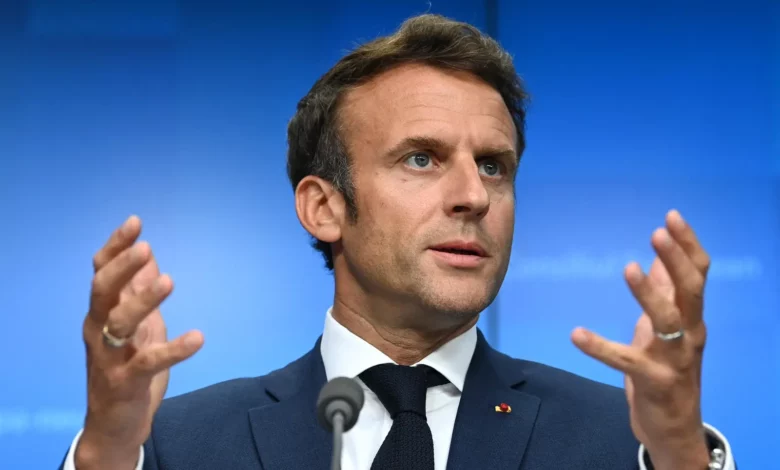The Macron Doctrine: 200 years after the Monroe Doctrine
200 years after the Monroe Doctrine

“History repeats itself,” some like to say. But for others- and I am one of these others- this claim is far from being realistic despite the element of truth obfuscated by its resounding metaphysicality.
It is this element of truth which is my focus here. Almost 2 centuries ago, more precisely on December 23, 1823, U.S. president James Monroe articulated what would later be called “The Monroe Doctrine” on the occasion of his State of The Union Address to Congress.
This doctrine, which outlines a U.S. foreign policy that would last until today, opposes any form of European interventionism or colonialism in the Americas and considers European political and military interventionist actions in the American continent an aggression against the U.S.
Interestingly, 200 years later, President Emmanuel Macron of France almost articulated a similar theory with a change of roles in the new narrative. Europe, Macron insisted, should not be drawn into a hypothetical conflict between China and the U.S. over Taiwan. European sovereignty, he argued, requires Europe not act like a “vassal” of the U.S. or China.
The Monroe and the Macron doctrines are symmetrical. They were both articulated by two heads of state on behalf of their continents against the influence of political actors from other continents. The new worldviews outlined by both doctrines were received with suspicion.
Legend says that in Europe, policymakers did not pay heed to what President Monroe had said. Material evidence that President Monroe was taken seriously in Europe and America still exists. In 1924, Harold Temperley studied in a paper published in The English Historical Review some documents which reveal that a mood of suspicion reigned in Europe as to the intentions of President Monroe and the British government whose worldviews seemed to align with those of the U.S.
For almost two months now, President Macron has been under constant criticism from European and U.S. elites, many of whom criticized the timing of the statements, which came hours after Macron arrived from a state visit to Beijing. Jean-Marie Guéhenno, a former French diplomat, argued that Macron spoke more as a university professor than head of State whose words are signals to be interpreted and reacted to by foreign policymakers.
U.S. Republican Senator Marco Rubio reacted by saying that Macron’s comments make it clear that the U.S. should focus on containing China and leave it to Europeans to handle the Ukraine War on their own.
In 1989, the Monroe Doctrine was first put into practice with the outbreak of the Spanish-American War. For the first time since the War of 1812, the U.S. declared war on a European power, joining the war effort on the side of the Cubans against the ailing Spanish empire.
During the Cold War, the U.S. found in this doctrine a moral and political justification for its opposition to the wave of zealous Communism South of the Border on grounds that Communist groups, guerrillas, and parties were supported by the Soviet Union.
Until today, the spectrum of the Monroe Doctrine afftects the U.S. stance on Cuban, Venezuelan, and Ecuadorian politics.
What made the Monroe Doctrine a doctrine is its application in the real world. What makes the Macron Doctrine less of a doctrine is its confinement to theory. But the fact that this new doctrine has not turned into policy should not blind us to its potential to become a doctrine.
The foreign threats to European homogeneity are not limited to irregular immigrants and U.S. banking crises imported via a post-WWII history of dependence on foreign capital and a global financial order that venerates open economic borders.
As the war in Ukraine heads towards its second year, North Atlantic divisions- besides inter-European disagreements- on how to handle this conflict are transpiring to show some skeptics in Europe that Marco Rubio’s comments might make sense and that they may need to think of this conflict as an inter-European rather than Global one. In November 2022, Top European officials accused the U.S. of exploiting the war in Ukraine to make profit from skyrocketing gas prices and weapons sales.
Looking at the Ukraine conflict as a European rather than Western one concords to some extent with the Macron Doctrine. In other words, because of differences between major Western political actors, the conflict might end up being seen by some Europeans as a one within the European family rather than part of a new Cold War between the Global West and a Global East led by Russia. This emerging logic interweaves into Macron’s comment, questioning the significance of involvement in Taiwan to EU interests, during his interview with Politico, that Europe would better act like a third superpower rather than be drawn into superpower rivalries.
Besides, Europe may realize foreign conflicts are more detrimental than beneficial to its cohesiveness and capacity for acting. Disagreements on how to handle urgent issues have also marked the inter-European debate. Finding a European common ground might be hindered by foreign actors. Germany’s commitment to the traditional Western line was translated into German Foreign Minister Annalena Baerbock heading to China to make up for Macron’s comments.
Besides, The Macron Doctrine depends on Europeans realizing that there is a benefit in Europe acting as an independent geostrategic power. These days, Europe is going through a second energy crisis that is deepening its dependence on its southern Mediterranean neighbors, many of whom are taking their ties with Russia and China to an upper level. Likewise, the second immigration crisis is underway and it is adding to the significance of the southern neighborhood to Europe. Yet, the emerging stance in the MENA region is one that advances a clear condition before any kind of deeper cooperation: it is the end of European conditionality.
A major geopolitical disagreement between Europe and the MENA region today is the normalization of ties between Syria and its Arab neighbors. The chances that Europe will force Syria into regional isolation again are null. But why isolate Syria in the first place? The European involvement in the Syrian crisis at the beginning of the previous decade had nothing to day with Europe’s immediate geostrategic interests. On the contrary, arming the Syrian opposition, an act in which some European powers were involved, further escalated the civil war, thus contributing to the immigration crisis in 2015 where Europe had to deal with the influx of millions of refugees.
European involvement in the Syrian crisis just made sense to those Europeans who looked at the world from the perspective of a Western block facing an Eastern one. Yet, today, it is the cause of these particular Europeans which is losing its appeal.
Europe has much interest in not straining its relations with China over Taiwan. The Chinese economy is very intertwined with almost all the European economies. Economic ties between China and the EU are, as Politico describes them, “two-way streets,” thus amounting to the level of interdependence. China has invested in almost all European economies and vice versa. China is the 3rd largest importer of European goods and accounts for 19% of the goods imported by EU members. This interdependence makes it reasonable to fear conflict with this superpower.
The long-term effects of the China-Taiwan and Russia-Ukraine crises will decide whether future historians will talk about “the Macron Doctrine.” The unlikely simultaneous and successful containment of both Russia and China by a unified Western front is what will send Macron’s statements down the drains of history.




